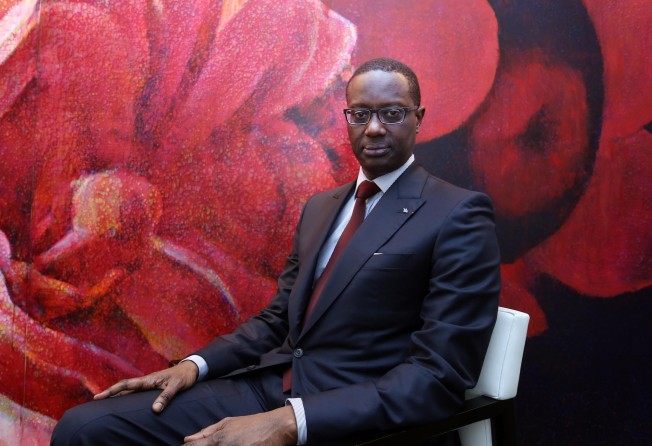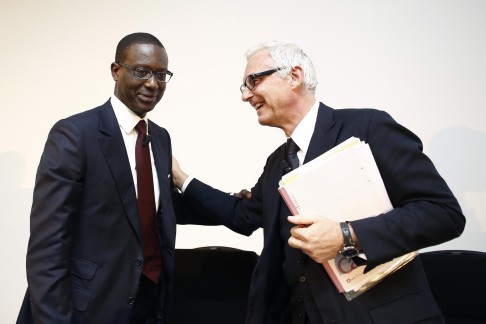Why Asia matters so much to the new boss at Credit Suisse
Tidjane Thiam, the bank's new chief executive, believes in global wealth creation in emerging markets, and profits from the region have doubled over the last year

Flick through the presentation slides Tidjane Thiam and his team ran through with investors when the newly installed Credit Suisse chief executive unveiled second-quarter earnings and it quickly becomes apparent why his first trip two weeks later is to Asia - it is his golden goose and he makes no bones about it.
"What I've made my name in and what I believe in is global wealth creation in emerging markets," Thiam told the South China Morning Post. "I used to sell insurance, so selling wealth management is riding the same wave frankly in macroeconomic terms. That's what I came here to do."
Thiam was chief executive of Prudential, the international insurance group, before he joined Credit Suisse on July 1.
About 40 per cent, or 6.3 billion Swiss francs (HK$51 billion), of the bank's net new assets were generated in Asia in the three months ended June. The region is the bank's fastest growing globally. Profits have doubled from a year ago and represent 27 per cent of all pre-tax income. Private banking had its best quarter on record for revenues and its strongest first-half profits in eight years.
Present figures like that to other executives and they might well be tempted to head instead to an underperforming region, kick a few butts there and urge local management to learn from their shortcomings.
But Thiam likes to see things differently from the average chief executive. Which is hardly surprising given that he is not the average chief executive - he is an African, born in Cote d'Ivoire, raised and educated in France, began his career at McKinsey, went on to be minister of planning and development in his home country and then returned to the consulting giant as a partner in Paris, all before getting into the insurance business at Britain's Aviva and then Prudential.
The 53-year-old reckons the bigger value is in understanding success.
"I listen to radio and today I was listening to a psychologist who was saying that we don't draw the lessons from our successes," Thiam said. "We just tend to take them and think they are because of our skill. We never look. He was making a good point in that you need to try to understand your successes.
"The thesis is that failure is so much more useful than success because you don't do anything with success. Failure is useful because we're wired psychologically to look at failure more closely. It's a very interesting observation."

"My predecessor had done a good job. Brady is a really highly regarded professional and has a distinguished track record. I can say he is a friend and you will not find me saying anything negative about him. I am his successor and I am lucky to have had a good predecessor," he said before turning the conversation to the future.
"I am focused on driving the company forward. I do what is right for the company, for shareholders and for staff. With my background, I did not come here to build a global investment bank. Anybody can understand that. If that was the strategy, I would not have been offered the job and I would not have accepted it either as that is not something I am competent for."
Which brings us onto the subject of what exactly Thiam wants to build at Credit Suisse? His vision is of a global wealth manager with a robust private and investment banking presence. One of his first acts was to launch a strategic review of the business. It is due for completion by the end of the year and speculation runs rife about what it will conclude. Thiam is giving nothing away.
“I admire your persistence,” he said in response to a third attempt at a different tack to squeeze an answer out of him.
What he will say is that the bank has a finite supply of capital and it must be deployed where it makes the best return.
"Clearly that means that there is a need to look at a number of investment banking activities and decide exactly which ones we want to conduct and to what extent. It is not enough to rightsize the investment bank - you also have to grow. So how do you grow faster? Where do you grow? Is it China? Is it elsewhere? Those are big questions."
By implication, the conclusion of the review will be as much about investing for growth as it will be about cutting unprofitable activity. And Thiam is clear about the need for growth.
"Performance is not optional," he says. "I'm very focused on performance, but it's never performance for the sake of performance. It's performance because of what it allows you to do. It gives you options. When a company is on the back foot, it ends up having to cut costs, to cut costs in a way that is not always optimal and all that is very damaging."
He is equally clear about the need for flexibility if he is to succeed. "You have to be willing to change your mind. Most catastrophes are caused by a decision that wasn't a bad decision given the set of facts or circumstances that the decision was based on, but by a decision that was not revisited when those facts or circumstances changed fundamentally. That leads to disaster. But it happens a lot - pride gets in the way."
Investors seem confident that Thiam will get it right - the bank's shares rallied sharply after his appointment was announced in March - but he is not letting that go to his head. "There is a very famous CEO of Prudential, Mick Newmarch, and he said something which is repeated from one CEO of Prudential to the next - any CEO who thinks that there is any correlation between short-term share price movements and his actions is delusional."